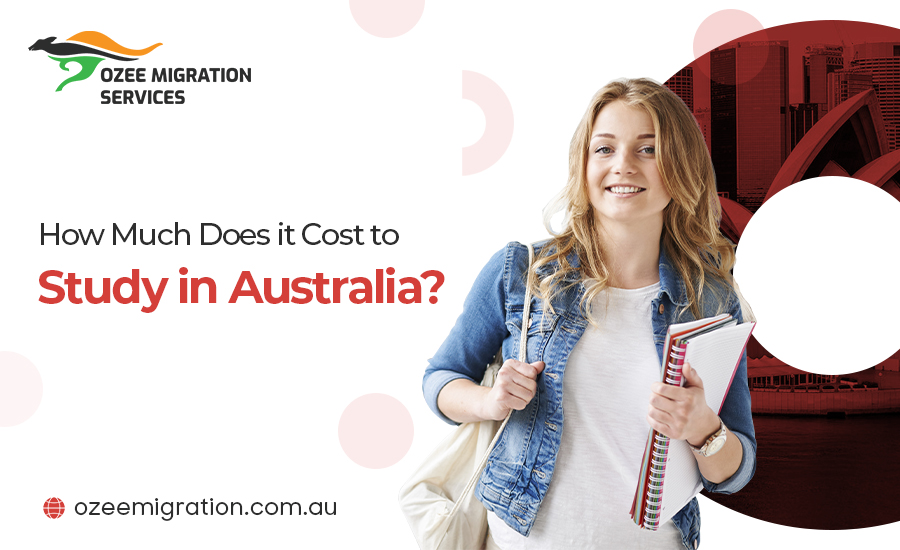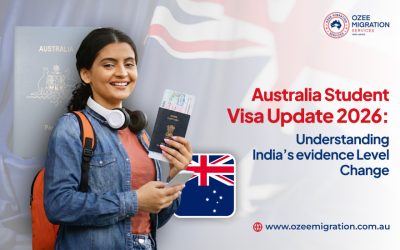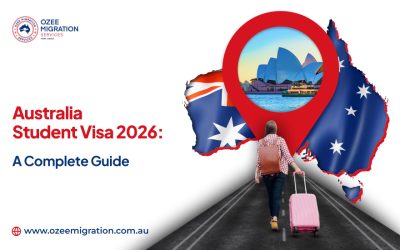How Much does Student Visa Cost in Australia?

Studying abroad can be costly, but planning your budget wisely can help you keep a firm grip on your finances. Include expenses such as accommodation, food, health insurance, and travel in addition to your tuition fee when calculating the student visa cost in Australia. This will help you plan your budget more effectively.
For International students studying in Australia, the cost of living expenses in Australia ranges from 2,500 to 6000 AUD per month to cover the living expenses of their students, such as accommodation and food, transport, and social events.
Tuition is your Main Expense.
The type of qualification you pursue and the university or school you attend determine the tuition fee you pay. Degrees in veterinary medicine and medicine, for example, are significantly more expensive than other degrees. Tuition fees at tertiary institutions in Australia typically range between AUD 20,000 and AUD 30,000 per year.
These are the typical values of the expenditure.
| 1. | School | $7,800 to $30,000 annually |
| 2. | English language studies | $350-450 weekly (varies as per course length) |
| 3. | Vocational Education and Training (Certificates I to IV, Diploma and Advanced Diploma) | $4000 – $22,000 annually |
| 4. | Undergraduate Bachelor’s degree | $15,000 – $35,000 annually |
| 5. | Postgraduate Master’s Degree | $20,000 – $42,000 annually |
| 6. | Doctoral Degree | $20,000 – $42,000 annually (scholarships available up to 100% with living grants on meeting the university requirements). |
Humanities, arts, and education courses are typically less expensive, whereas courses in medicine and engineering are more likely to be more expensive. If you want to study at a higher level, the tuition fee is usually higher, and the costs vary depending on the program. If you want to reduce your educational costs, you should apply for various scholarships available to Indian students.
Where are you going to live? Determine the cost of lodging.
The majority of Australian universities offer on-campus housing to international students. You can also live off-campus, sharing apartments with other Nepalese students or staying with an Australian family. Every two weeks, rent is usually paid in advance. Keep in mind that rental prices vary by city.
| Accommodation Type | Expenses (Indicative) |
| Hostels and Guesthouses | $90 to $150 per week |
| Shared Rental | $95 to $215 per week |
| On-campus | $110 to $280 per week |
| Homestay | $235 to $325 per week |
| Rental | $185 to $440 per week |
| Boarding schools | $11,000 to $22,000 a year |
The Cost of your Student Visa
The first step in studying in Australia is to obtain a valid student visa, which comes with its own set of fees (approx. AUD 606). Please contact your counsellor for the most recent information and updates on the visa application process and costs.
Costs of living
You should budget for groceries, social activities, and emergencies. It is best to keep track of your expenses when studying in a foreign country so that you do not overspend. According to the Australian government, general living expenses total $21,041 per year. The annual budget of an international student ranges from $20,000 to $27,000. (given your living arrangements and personal choices).
Keep the following common expenses in mind when making your budget:
| Living Expenses | Weekly budget (indicative) |
| Groceries and eating out | $140 to $280 |
| Gas, electricity | $10 to $20 |
| Phone and Internet | $15 to $30 |
| Public transport | $30 to $60 |
| Car (after purchase) | $150 to $260 |
| Entertainment | $80 to $150 |
Be Cautious. Think about Health Care and Insurance.
Prior to the start of their programmed, all students planning to travel to Australia from Nepal must obtain medical insurance. Medical insurance typically costs around AUD 500 per year (indicative). Every international student in Australia has access to a wide range of health and support services. We can assist you in obtaining the necessary Overseas Student Health Insurance (OSHC).
Transportation. Determine how much it will cost to relocate.
You’ll have to rely on public transportation unless your institution provides a shuttle service to and from your lodging.
| For Short Distances | Regional trains, buses, and trams are available. A short bus or train ride can cost around AUD 3. A weekly pass can cost up to AUD 20 or a monthly pass can cost up to AUD 80. Except for Victoria, student discounts are widely available in all states and territories. |
| For Long Distances | For traveling between different cities, you can avail of any of the following options:
|
Do Not Disregard your Taxes.
International students are unable to work in Australia unless they obtain a Tax File Number (TFN). Under this arrangement, you are permitted to work 20 hours per week during academic sessions and full-time during vacations. Your earnings will be taxed if you choose to work in addition to studying.
Keep in mind that currency fluctuations can affect your budget. We also advise you to look for part-time work while studying in Australia or to apply for scholarships at the universities to which you apply. This has the potential to significantly reduce the cost of studying abroad.
Also Read:- Why To Hire an Australian Migration Agent For Visa Processing?
Recent Posts
 What Is the Processing Time for a 190 Visa in Australia?February 18, 2026
What Is the Processing Time for a 190 Visa in Australia?February 18, 2026 Key Changes and Trends for the Subclass 491 Visa in 2026February 11, 2026
Key Changes and Trends for the Subclass 491 Visa in 2026February 11, 2026 How Can You Prove a Genuine De Facto Relationship for an Australian Partner Visa in 2026?January 30, 2026
How Can You Prove a Genuine De Facto Relationship for an Australian Partner Visa in 2026?January 30, 2026 Australia Student Visa Update 2026: Understanding India’s Evidence Level ChangeJanuary 20, 2026
Australia Student Visa Update 2026: Understanding India’s Evidence Level ChangeJanuary 20, 2026 What Are the Latest Changes to the Subclass 186 ENS Visa?December 23, 2025
What Are the Latest Changes to the Subclass 186 ENS Visa?December 23, 2025


